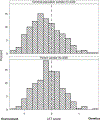Nature vs. Nurture in Precision Education: Insights of Parents and the Public
- PMID: 34644234
- PMCID: PMC9083499
- DOI: 10.1080/23294515.2021.1983666
Nature vs. Nurture in Precision Education: Insights of Parents and the Public
Abstract
Background: The philosophical debate about the roles of nature versus nurture in human flourishing is not new. But the rise of precision education-a growing field of research that encourages the use of genetic data to inform educational trajectory and interventions to better meet student needs-has renewed historical and ethical concerns. A major worry is that "genetic hype" may skew public perceptions toward a deterministic perception of the child's educational trajectory, regardless of the child's capacities, and underestimation of environmental factors affecting educational outcomes. We tested this hypothesis with parents and adults from the general public in the US.
Methods: A newly developed computerized implicit association test (IAT) to assess automatic associations between genetics or environments and student behaviors that are associated with educational achievement was administered to samples of parents of children below 21 years old (n = 450) and adults from the general public (n = 419). The samples were representative of the adult US population and adjusted to oversample Black/African American participants. An overall D score for participants' IATs (range: [-2, 2]) was calculated on the basis of the speed of participants' responses.
Results: The mean IAT score for both samples indicated stronger association between the quality of being a good student and environment rather than genetics (parents: mean=-0.146, t = -6.56, p < 0.001; general public: mean = -0.249, t = -9.45, p < 0.0001). Younger participants from the general public showed a stronger association between genetics and educational success than middle-aged participants (β = -0.301, p = 0.006).
Conclusion: The views of parents and the general public on behavioral genetics and education are complex but call for investment in creating educational environments that are supportive of student success. Future research is needed to understand differences across age groups and to explore views of other stakeholders involved in determining children's educational trajectories about the roles of nature versus nurture in precision education.
Keywords: behavioral genetics; environment; implicit association test; precision education.
Conflict of interest statement
Declaration of interest statement
Maya Sabatello is a member of the All of Us Research Program’s Institutional Review Board. The authors declare no other conflict of interest.
Figures
References
-
- Americans with Disabilities Act. 2008. (Public Law 110–325, ADAAA).
-
- Asbury K & Plomin R 2013. G is for Genes: the Impact of Genetics on Education and Achievement. Wiley-Blackwell. 10.1002/9781118482766 - DOI
-
- Asbury K, Rimfeld K, & Krapohl E 2017. Can (and Should) We Personalize Education Along Genetic Lines? Lessons from Behavioral Genetics. In Bouregy S, Grigorenko E, Latham S, & Tan M (Eds.), Genetics, Ethics and Education (pp. 63–85). Cambridge: Cambridge University Press.
-
- Aud S, Fox MA, KewIRamani A 2010. Status and Trends in the Education of Racial and Ethnic Groups. http://nces.ed.gov/pubs2010/2010015.pdf
Publication types
MeSH terms
Grants and funding
LinkOut - more resources
Full Text Sources
Miscellaneous

